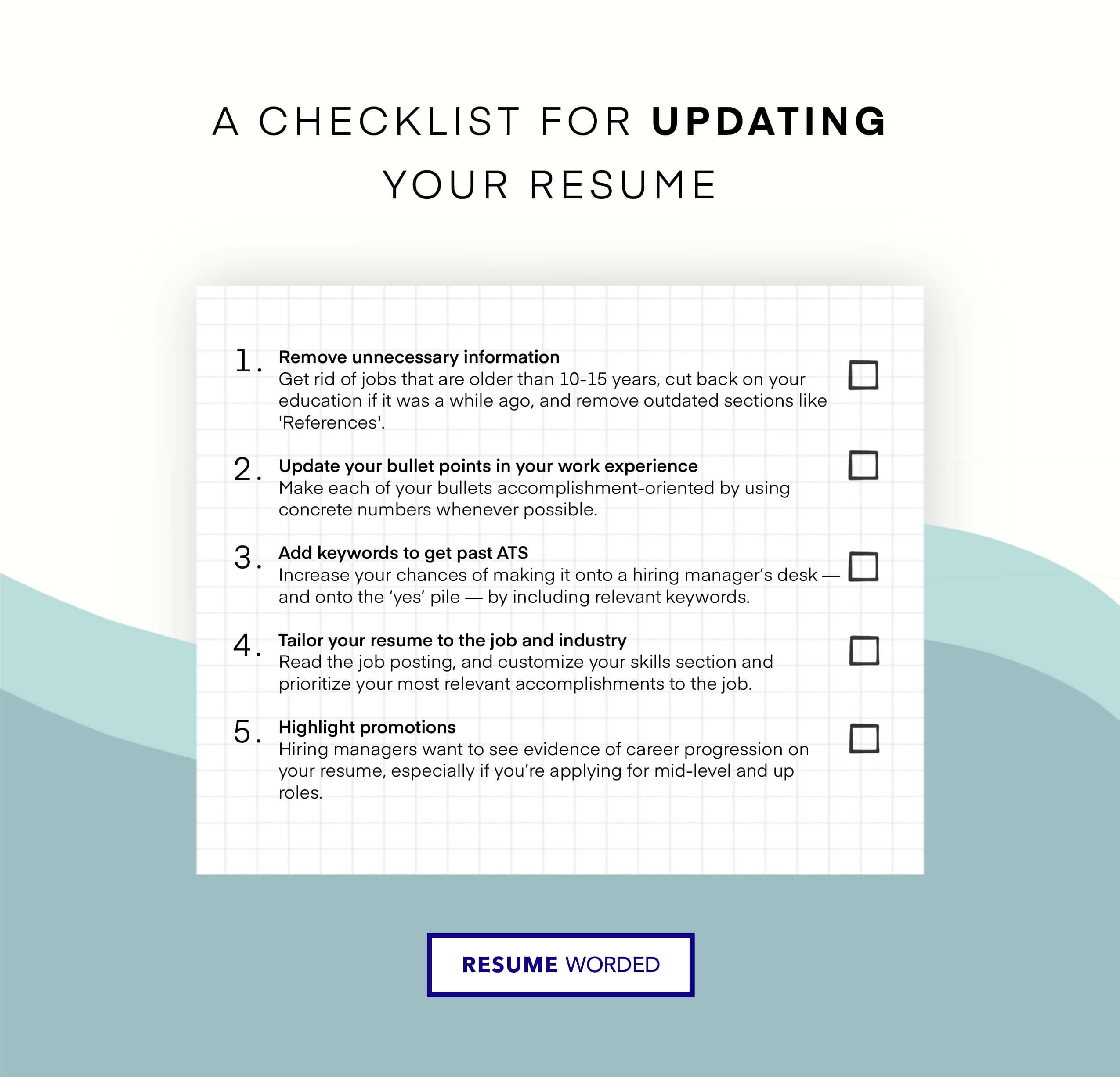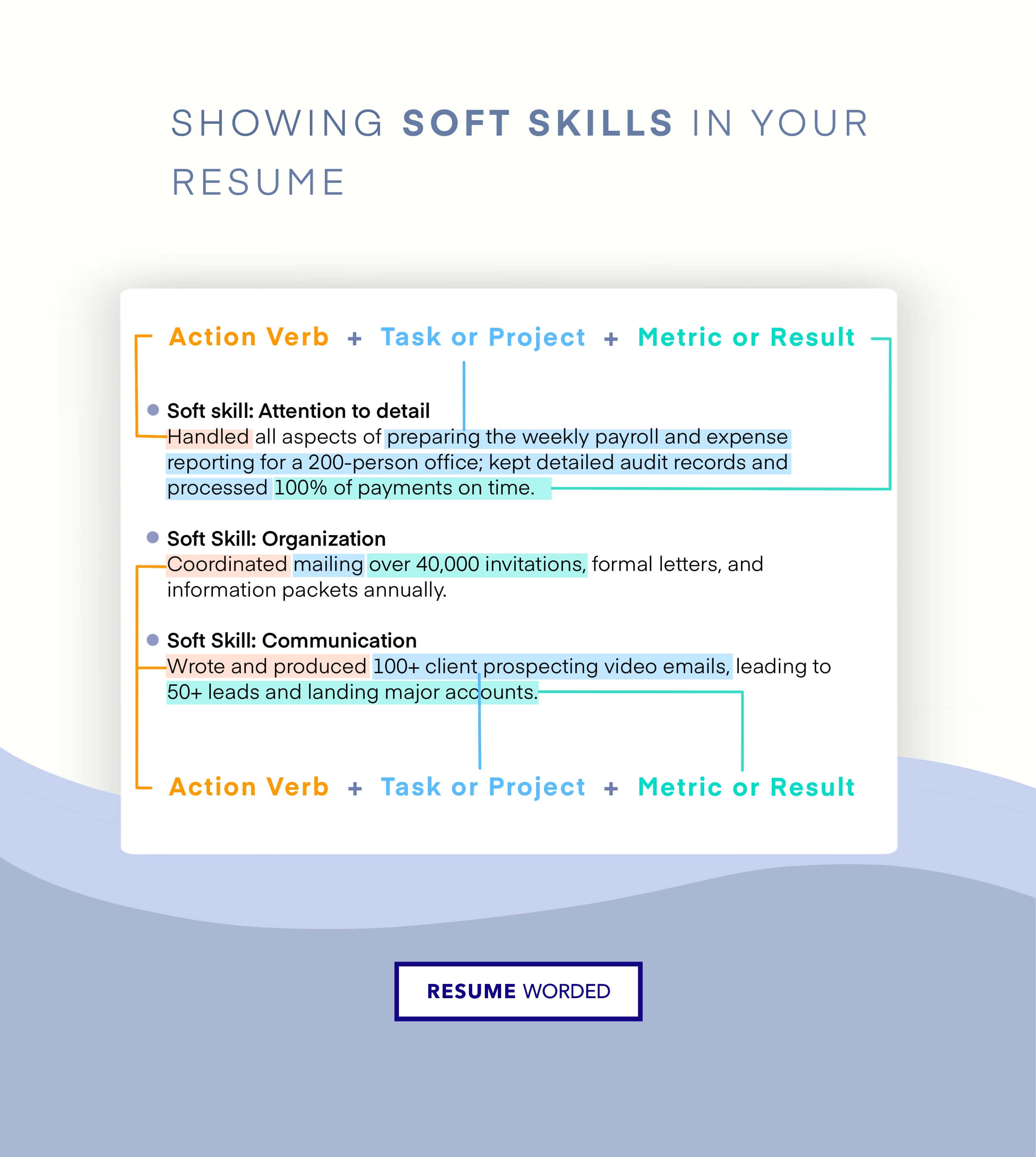It’s a tough job market out there right now, which means that you’re probably looking for something to set you apart from the growing sea of applicants. One of the quickest and easiest ways to do this is with short or online courses such as Udemy certificates. But do they really belong on your resume?
Yes, you can add a Udemy certificate to your resume. But that doesn’t always mean you should!
Below, we’ll discuss when you should list a Udemy certificate to your resume, how to effectively showcase the skills you learned, and everything else you should know about Udemy before you add it to your resume.
But first: Here’s how to list short courses like Udemy on your resume:
How to put Udemy certificates on your resume
- Make sure the certificate is directly relevant to the job you’re applying for. If it’s not obviously connected or if you have more impressive accomplishments on the same topic, it’s best to leave it off.
- Choose where on your resume to list the certificate — we’ll explain the best options in the next section below.
- Include the course title and completion date.
- (Optional) Add any relevant information about the certificate, including skills you acquired, high course ratings, or a particularly well-known instructor. This can help explain the relevance of the course to a recruiter and present your online learning in a professional manner.
Now that we’ve covered the basics, let’s take a look at some examples of where to list Udemy certificates on your resume.
Where to put Udemy certificates on a resume
The best places to put Udemy on your resume are:
- In a dedicated Certificates or Professional Development section
- As part of your Education section
- Under Additional Information
Let’s take a closer look at each of these options.
Udemy certificates in a Certifications section
If you completed any particularly relevant or prestigious certificates (Udemy or otherwise) and you want to show them off, consider including a dedicated Certifications section toward the bottom of your resume, underneath your Work Experience section. For example:
CERTIFICATIONS
- Digital Marketing Specialist (Udemy), 2020
- Project Management Professional (PMP), 2016
Udemy certificates in an Education section
Listing a Udemy certificates under Education can help round out this section and highlight self-taught skills. It can also showcase your commitment to continued learning and highlight competetive skills in-line with current job market trends. For example:
EDUCATION
Bachelor of Science in Computer Science, Resume Worded University, 2021
Python Programming Certification, Udemy, 2020
Udemy certificates in an Additional Information section
If your resume is already full, or if you have a semi-relevant Udemy certification you can’t quite bring yourself to cut, it’s okay to mention it briefly in an additional section right at the end of your resume. For example:
ADDITIONAL INFORMATION
Skills: Python, HTML, CSS, JavaScript, My SQL
Certificates: Udemy Python Programming Certification (2017)
Awards: Growthsi Employee of the Year (2020)
If you're not sure if you've listed your Udemy certificate on your resume the right way, upload it to the tool below – it'll scan it and give you detailed feedback and suggestions on how to improve your resume.
Should you include a Udemy certificate on your resume?
The decision to include a Udemy certificate on your resume depends on the relevance of the course to each specific application. Consider these key points when deciding to include or exclude your certificate:
- Only include courses directly related to the job role you are applying for, demonstrating relevant skills or industry knowledge asked for in the job description.
- Ensure the course aligns with high-demand skills in your field.
- Ensure the course skill level is a match for the position. For entry-level positions, foundational courses are great; for higher roles, advanced courses are more appropriate.
- Prioritize recent courses you’ve taken within the last few years and remove any older or expired credentials.
- Include the certificate if your professional experience is limited and it showcases skills you do not have paid experience with.
- If you have alternate paid experience that highlights the same skills, omit your Udemy certificate in favor of this experience.
Sample resume including a Udemy certificate
Here’s an example of a finished resume that contains a Udemy certificate in the Education section:
You can browse and download hundreds more resumes at our ATS resume templates page.
The value of a Udemy certificate
Now, let’s talk about exactly what a Udemy certificate is.
Udemy certificates explained
Udemy is an online learning platform that offers courses on a wide range of topics, including technology, business, and creative skills. It offers both paid and free options — generally, paid courses feature more comprehensive content, higher-quality materials, and better support from instructors.You can pursue different certificate options, each representing a different level of completion and mastery of a course:
- Certificate of Completion
- Certificate of Achievement
- Udemy Diploma
Udemy is not an accredited course provider, which means that a Udemy certificate may not be valued by all employers. The value of a Udemy certificate will depend on your industry, employer, and location. In India for example, Udemy courses are gaining a lot of traction. The same is true of the tech industry, where online courses like Udemy tend to have more practical value.
Is a Udemy certificate worth it?
Whether or not a Udemy certificate is worth it depends on several factors:
- If you can use it to showcase specific skills, demonstrate commitment to professional growth, or stay up-to-date with industry trends.
- If the course content is relevant, comprehensive, and taught by a knowledgeable instructor.
- The specific preferences of the industry and employer. Traditional degrees and certifications from established institutions may still hold more weight with some employers.
Pro tip: For added value, look for courses that include “Certificate of Completion” in the course description or features.
The most competitive Udemy Courses for 2024 to add sought-after skills to your resume
In an ever-evolving job market, staying competitive is crucial. With the rise in remote working opportunities and digital trends, showcasing in-demand technical skills is a real asset to any resume. Here are some of the most current and competitive Udemy courses to consider taking in 2024:
- Digital Marketing: Digital marketing skills are highly sought after in multiple industries. Courses such as "The Complete Digital Marketing Course" offer comprehensive training in SEO, social media marketing and email marketing, vital for roles in marketing, advertising, and brand management.
- Data Science and Analytics: With the growing importance of data in decision-making, courses like "Machine Learning A-Z" and "Data Science and Machine Learning Bootcamp" have become extremely popular. These courses teach practical skills in data analysis, machine learning, and statistical modelling, making them invaluable for careers in data science.
- Web Development: Web development skills remain in high demand across various industries. Courses like "The Complete Python Bootcamp", "The Web Developer Bootcamp," and "JavaScript: Understanding the Weird Parts" provide hands-on experience in HTML, CSS, JavaScript, and other web technologies essential for careers in web development and software engineering.
- Project Management: Effective project management is crucial, no matter your industry. Courses such as "Project Management Professional (PMP)" offer insights into methodologies like Agile and Scrum, which are invaluable for project managers and team leaders.
- Artificial Intelligence and Machine Learning: With AI and ML reshaping many sectors, courses like "Artificial Intelligence A-Z" provide a deep understanding of these technologies, which is helpful for roles in tech development, research, and innovation.
How to use a Udemy certificate to jump-start a career change
Online courses like Udemy can be a powerful catalyst for career change. Here's a step-by-step guide on using these courses to gain the necessary skills and knowledge to jump-start your new career path.
Identify your new career path
Research industries and roles that interest you, and identify the skills and knowledge required in those fields. Now, compare your current skills with those needed for your desired position to give you an idea of which courses will help enhance your resume.
Choose a course
Look for courses with high ratings, positive reviews, and practical, hands-on learning. Applying what you learn through projects, portfolio creation, and real-world scenarios will solidify your learning and make your new skills more tangible to potential employers.
Stick to a schedule
Though online learning gives you the flexibility to learn at your own pace, setting a regular schedule can help maintain momentum and ensure you reach your targets.
Update your resume and LinkedIn profile
Once you complete your course, update your resume and LinkedIn profile to reflect your newly acquired skills. Highlight any projects or practical work you've done as part of your coursework, and link to your newly created portfolio if possible.
Gain real-world experience
Apply your new skills in a practical setting through freelancing, volunteering, or internships. Real-world experience in your new field can significantly boost your resume and confidence.
Apply for jobs in your new field
Start applying for roles in your new field and tailor your application to highlight how the skills gained from your Udemy courses are relevant to the job requirements. You can continue learning online while applying for positions to add new skills to your resume.
Alternatives to Udemy certificates
If you choose not to put a Udemy certificate on your resume, what can you do instead? Try:
- Google Career Certificates or Coursera courses as an alternnative to Udemy
- Pursuing an accredited online course from a univeristy or reputable institution
- Volunteering or freelancing in your field to gain practical experience
- Participating in industry events or conferences to expand your professional network and stay up-to-date with current developments
- Building a personal website or online portfolio to showcase examples of your actual work










